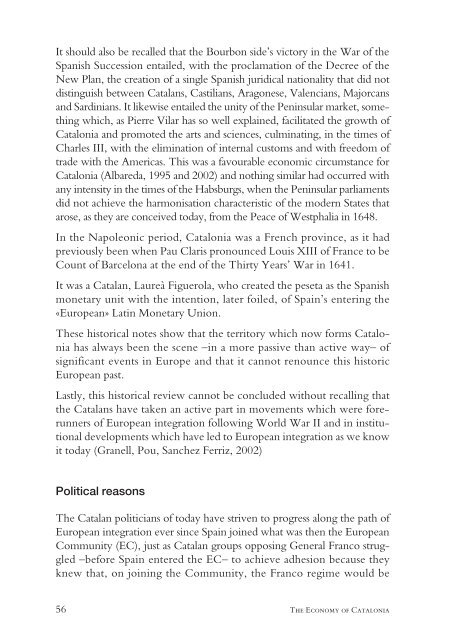The Economy of Catalonia
the_economy_of_catalonia._questions_and_answers_on_the_economic_impact_of_independence
the_economy_of_catalonia._questions_and_answers_on_the_economic_impact_of_independence
You also want an ePaper? Increase the reach of your titles
YUMPU automatically turns print PDFs into web optimized ePapers that Google loves.
It should also be recalled that the Bourbon side’s victory in the War <strong>of</strong> the<br />
Spanish Succession entailed, with the proclamation <strong>of</strong> the Decree <strong>of</strong> the<br />
New Plan, the creation <strong>of</strong> a single Spanish juridical nationality that did not<br />
distinguish between Catalans, Castilians, Aragonese, Valencians, Majorcans<br />
and Sardinians. It likewise entailed the unity <strong>of</strong> the Peninsular market, something<br />
which, as Pierre Vilar has so well explained, facilitated the growth <strong>of</strong><br />
<strong>Catalonia</strong> and promoted the arts and sciences, culminating, in the times <strong>of</strong><br />
Charles III, with the elimination <strong>of</strong> internal customs and with freedom <strong>of</strong><br />
trade with the Americas. This was a favourable economic circumstance for<br />
<strong>Catalonia</strong> (Albareda, 1995 and 2002) and nothing similar had occurred with<br />
any intensity in the times <strong>of</strong> the Habsburgs, when the Peninsular parliaments<br />
did not achieve the harmonisation characteristic <strong>of</strong> the modern States that<br />
arose, as they are conceived today, from the Peace <strong>of</strong> Westphalia in 1648.<br />
In the Napoleonic period, <strong>Catalonia</strong> was a French province, as it had<br />
previously been when Pau Claris pronounced Louis XIII <strong>of</strong> France to be<br />
Count <strong>of</strong> Barcelona at the end <strong>of</strong> the Thirty Years’ War in 1641.<br />
It was a Catalan, Laureà Figuerola, who created the peseta as the Spanish<br />
monetary unit with the intention, later foiled, <strong>of</strong> Spain’s entering the<br />
«European» Latin Monetary Union.<br />
<strong>The</strong>se historical notes show that the territory which now forms <strong>Catalonia</strong><br />
has always been the scene –in a more passive than active way– <strong>of</strong><br />
significant events in Europe and that it cannot renounce this historic<br />
European past.<br />
Lastly, this historical review cannot be concluded without recalling that<br />
the Catalans have taken an active part in movements which were forerunners<br />
<strong>of</strong> European integration following World War II and in institutional<br />
developments which have led to European integration as we know<br />
it today (Granell, Pou, Sanchez Ferriz, 2002)<br />
Political reasons<br />
<strong>The</strong> Catalan politicians <strong>of</strong> today have striven to progress along the path <strong>of</strong><br />
European integration ever since Spain joined what was then the European<br />
Community (EC), just as Catalan groups opposing General Franco struggled<br />
–before Spain entered the EC– to achieve adhesion because they<br />
knew that, on joining the Community, the Franco regime would be<br />
56 <strong>The</strong> <strong>Economy</strong> <strong>of</strong> <strong>Catalonia</strong>


